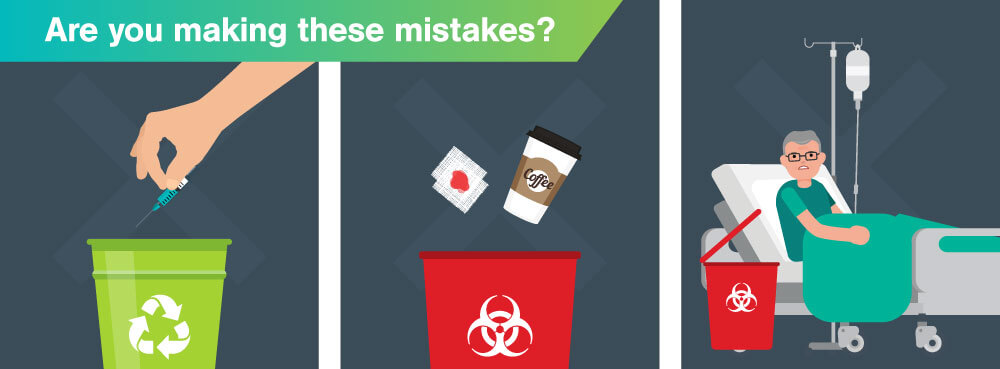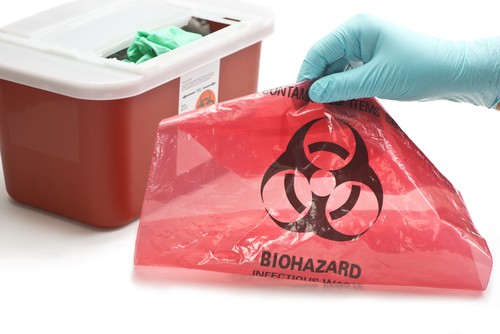Making Certain Safe Handling and Disposal of Medical Waste
Guaranteeing safe handling and disposal of medical waste is of paramount significance in healthcare setups. Incorrect administration of medical waste can present considerable threats to the setting, public health and wellness, and medical care workers. This necessitates adherence to strict standards and protocols for its secure handling and disposal. In this introduction, we will check out the relevance of correct medical waste administration, the dangers related to incorrect handling and disposal, as well as the guidelines and methods that can be carried out to ensure its safe disposal. In addition, we will certainly go over the importance of training and education for medical care professionals in order to preserve a safe and tidy healthcare environment. By complying with these practices, we can successfully alleviate the prospective threats connected with clinical waste.
Significance of Proper Medical Waste Monitoring
Correct medical waste monitoring is of utmost value in ensuring the security and wellness of healthcare professionals, clients, and the basic public. Clinical waste refers to any kind of waste produced by medical care facilities throughout the diagnosis, therapy, or booster shot of human beings or animals. This waste can pose severe health and wellness risks if not taken care of and dealt with correctly.
Among the primary factors why correct clinical waste monitoring is essential is to stop the spread of transmittable conditions. Clinical waste, such as made use of needles, polluted dressings, and biological materials, can lug hazardous microorganisms. If not handled and thrown away appropriately, these microorganisms can be transferred to health care workers, clients, waste handlers, and even the basic public, causing the possible outbreak of illness.
Additionally, proper medical waste management helps shield the atmosphere - medical waste removal service. Medical waste includes dangerous materials, including chemicals, drugs, and radioactive substances. When not managed suitably, these compounds can pollute soil, water bodies, and the air, positioning a considerable danger to ecosystems and public wellness
Moreover, reliable clinical waste monitoring ensures conformity with international requirements and local laws. Federal governments and governing bodies have actually developed guidelines and methods to ensure the secure handling, storage, transportation, and disposal of clinical waste. Abiding by these policies is vital to prevent lawful effects and preserve the track record and credibility of healthcare centers.
Dangers of Improper Handling and Disposal

If medical waste is not properly disposed of,Individuals can also be revealed to these transmittable diseases. For example, if contaminated needles or other sharps are not taken care of in assigned puncture-proof containers, they may inadvertently puncture individuals, leading to potential infections. If clinical waste is not set apart appropriately, there is a danger of cross-contamination between various types of waste, further enhancing the opportunities of condition transmission.
Inappropriate disposal of medical waste can additionally have damaging effects on the atmosphere and the basic public. If clinical waste is not treated and disposed of correctly, it can contaminate water resources, soil, and air, bring about the spread of conditions and toxins. This can have lasting consequences on communities and public health and wellness.
Guidelines for Safe Handling of Medical Waste
Applying effective procedures for the risk-free handling of clinical waste is essential in guaranteeing the defense of healthcare specialists, clients, and the public. These standards are critical in minimizing the dangers connected with the handling and disposal of clinical waste, such as infections, injuries, and environmental pollution.
First and foremost, health care facilities should develop a comprehensive waste monitoring plan that complies with local, national, and international policies. This strategy ought to consist of clear guidelines on waste partition, product packaging, transport, labeling, and storage. It is vital to separate various kinds of waste, such as sharps, contagious products, drugs, and non-hazardous waste, to stop cross-contamination and promote risk-free disposal.
Furthermore, medical care workers have to obtain complete training on appropriate waste handling strategies. They need to be informed on the prospective hazards of clinical waste, the appropriate use individual protective tools (PPE), and the proper procedures for managing, transferring, and taking care of various kinds of waste.
Moreover, medical care facilities should on a regular basis check and examine their waste monitoring methods to ensure conformity with guidelines. This consists of carrying out regular inspections, evaluating waste handling procedures, and supplying feedback and training to team participants.
Effective Techniques for Waste Disposal
To make certain the risk-free handling and disposal of medical waste, it is important to utilize effective methods for garbage disposal. Clinical waste can posture substantial threats to public wellness and the environment otherwise managed and gotten rid of properly. Consequently, health care facilities and waste management organizations have to implement suitable techniques to mitigate these dangers.
It entails separating different kinds of clinical waste based on their characteristics. Health care facilities need to give clear standards and training to team participants on exactly how to set apart waste properly.

Furthermore, medical care centers should team up with licensed waste management firms to guarantee proper disposal of clinical waste. These business have the competence and devices needed to safely handle and get rid of of clinical waste in conformity with guidelines and ideal practices.
Training and Education for Medical Care Professionals
Health care specialists play an important role in ensuring the secure handling and disposal of clinical waste via comprehensive training and education. It is vital for doctor to have a deep understanding of the possible threats connected with clinical waste and the correct methods for its monitoring. By getting proper training, medical care experts can reduce the possible transmission of contagious conditions, prevent environmental contamination, and protect both themselves and the general public.

Furthermore, training programs ought to emphasize making use of personal safety devices (PPE) and correct hand health methods when managing medical waste. medical waste disposal. Medical care professionals must know exactly how to properly dispose and make use of of PPE to protect themselves from possible exposure to harmful products. They must additionally be enlightened on the importance of regular handwashing and the proper use hand sanitizers to minimize the spread of contagious conditions
Proceeding education and regular updates on clinical waste administration practices are critical for healthcare professionals. As policies and guidelines progress, it is vital to keep doctor notified concerning any changes in protocols and best methods. This will make certain that they stay up-to-date and preserve a high criterion of safety in managing and getting rid of of medical waste.
Conclusion
In final thought, proper handling and disposal of medical waste is important to make certain the safety and security of health care specialists, people, and the atmosphere. By sticking to these practices, we can minimize the potential risks associated with medical waste.
Medical waste refers to any type of waste produced by medical care facilities during the diagnosis, treatment, or booster shot of animals or humans. If clinical waste is not segregated appropriately, there is a threat of cross-contamination in between various kinds of waste, more raising the opportunities of disease transmission.
It is important to separate various kinds of waste, such as more information sharps, infectious materials, pharmaceuticals, and non-hazardous waste, to protect against cross-contamination and promote secure disposal. WasteX Medical Waste Disposal.
To make certain the risk-free handling and disposal of clinical waste, it is essential to use effective methods for waste disposal. Furthermore, health care facilities ought to establish a routine waste collection and transportation routine to prevent waste accumulation and minimize the risk of mishaps or contamination.